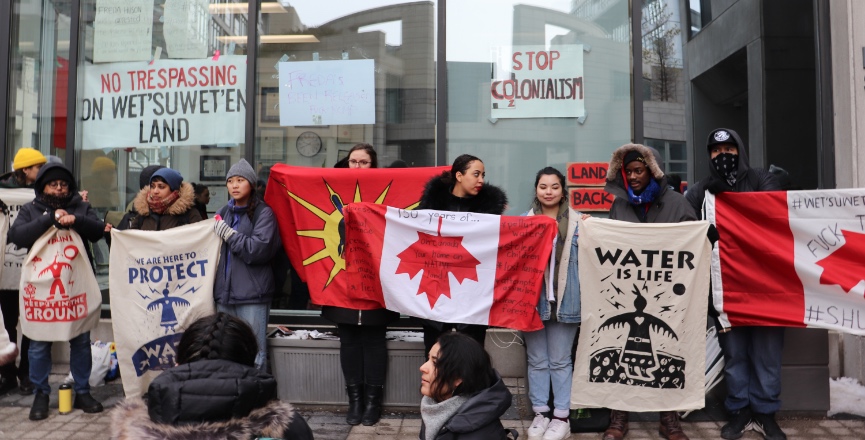“We fully believe, as Indigenous youth, that reconciliation is dead,” said Vanessa Gray, a land defender from Aamjiwnaang First Nation, after leaving Crown-Indigenous Relations Minister Carolyn Bennett’s office at around 9.30 a.m. on February 11. Gray was one of the nearly 25 Wet’suwet’en supporters who occupied Bennett’s office overnight and, like the other Indigenous youth in the group, chose not to take part in the meeting the minister had proposed.
This was one of many similar actions since February 6, when more than 40 RCMP officers raided camp Unist’ot’en and made arrests in the middle of the night. Since then, the police have dramatically extended the exclusion zone around the checkpoints, restricting media and land defenders both, as well as bringing in helicopters and police for support. The Wet’suwet’en people have issued a broad call for solidarity actions, in response to which supporters have blockaded multiple railways, the Port of Vancouver and all entrances to the British Columbia legislature building.
“Seeing the RCMP invade Wet’suwet’en, invade Unist’ot’en yesterday was just another sign of ongoing colonization right in front of our eyes,” said Samuel Wong, a Métis Cree land defender from northern Alberta. “We felt that there was no way we’re going to have this conversation with Carolyn Bennett because we knew that there was nothing good that was going to come out of it.”
The activists spoke to Bennett on the phone early on Monday afternoon to share their demand that she oppose the RCMP’s actions at Unist’ot’en. Over the course of the 35-minute phone call, the group requested that she speak out in opposition to the RCMP’s continued presence on Wet’suwet’en territory. They also asked her whether she would arrest Indigenous youth in her own constituency office. Bennett gave no clear answers, and repeatedly denied having any influence over the issue.
Brianna Olson-Pitawanakwat, an educator and social worker from the Wikwemikong First Nation, asked Bennett to comment on a recent report that revealed “government officials discussed tactics to … curb direct action or litigation by First Nations and to use federal money intended for the healing of residential school survivors to make treaty negotiations more attractive.”
“I would like to sit down in ceremony with you, and be able to make sure that we are hearing [each other],” Bennett told the peaceful demonstrators later in the conversation, after stressing the ministry’s desire to “do the right thing by all residential school survivors.”
Shortly after the end of the call, a solidarity rally of around 150 people that started in nearby Eglinton Park arrived outside the office windows. The crowd grew quickly, reaching around 250 when the group started dancing and playing music in the early evening. Seine Pak, a student in environmental studies at the University of Toronto, stayed throughout the night, as did a few others.
According to Pak, the neighbourhood was very supportive of the crowd as they waited out the night in the cold. “They brought hand-warmers, food, blankets … people … have been coming down, asking what this is about, and informing themselves.”
Pak also stressed the importance of going beyond awareness. “Either you stand for Indigenous people, the environment, the water, the land, your children, the future … You either stand for that or you don’t do anything, and you’re on the other side.”
Before Bennett’s arrival to the office on Tuesday morning, the five Indigenous land defenders who participated in the occupation left the office to close ceremony without her. They took turns speaking to the crowd of around 70 people, some of whom had stayed overnight, and others who started gathering early in the morning.
“Since we occupied Carolyn Bennett’s office, Freda [Huson] has been arrested,” Beze Gray, Vanessa Gray’s sibling and fellow land defender, told the crowd. Indeed, when the director of the Unist’ot’en healing center and daughter of one of the Wet’suwet’en hereditary chiefs was arrested, the group had been in the middle of conducting a prayer in her honour. “Reconciliation is dead,” they said to end their short speech, echoing the words that Vanessa Gray, Olson-Pitawanakwat, Wong and Anishnaabe kwe Métis multimedia artist and land defender Cricket Guest told the crowd.
“While we were holding [Bennett] accountable [for] her inaction, she decided that she would love to reconcile with us over ceremony, which we didn’t invite her to,” Wong explained. “She thinks she can invite herself to our ceremony, our sacred space. It’s supposed to be about healing, and healing together, and we know that she wasn’t coming in with any of those intentions.”
Bennett walked into her office at 10 a.m., escorted by four security personnel. During the meeting, she reiterated many of the ideas that had been expressed during the phone call, and continued to assert her lack of responsibility in the controversial affair.
The activists who had been in the meeting with her chose to end the meeting by collectively leaving the office at around 11 a.m., before holding a rally and then joining other groups to block the Yonge and Eglinton intersection for two hours.
“Don’t cry on the shoulder of the man that stole their land,” Wong told rabble.ca, paraphrasing Indigenous activist Arthur Manuel. “That’s why we didn’t meet [with Bennett] today. Because we’re tired of crying on the shoulder of these MPs … We’re going to disrupt society until Canada backs down.”
Anna Bianca Roach is a freelance journalist who covers social movements, labour and environmental justice.
Image: Anna Bianca Roach/rabble.ca




